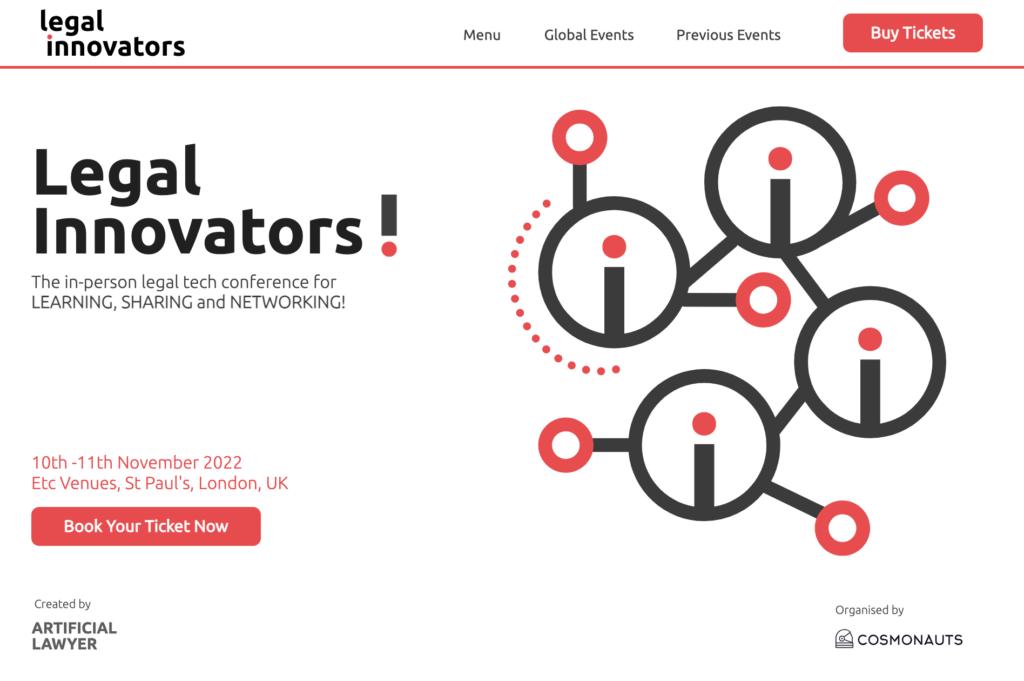
What took place at Legal Innovators California? Like most good things in life you just had to be there, (after all, that’s the whole point of in-person events). Instead, here are some thoughts that the trip to San Francisco and the very successful legal tech ecosystem conference generated.
Normal Today
During several moments at the Legal Innovators California conference I was reminded of the quote by Bill Gates: ‘We always overestimate the change that will occur in the next two years and underestimate the change that will occur in the next ten. Don’t let yourself be lulled into inaction.’
I.e. you think that not much is happening, as it all feels very incremental, then in hindsight you look back and go: ‘Wow! Things have really changed.’
And that effect was very apparent at the San Francisco conference. Although in this case, it was six years, not ten.
When I started Artificial Lawyer in June 2016, just writing that the use of ‘legal AI’, i.e. NLP and machine learning tools, could be used to replace some of the more basic and process-heavy review tasks that lawyers do, generated a polarity of responses. On one side you had the ‘roboteers’ who were getting a little bit carried away with the whole AI thing. On the other side you had a bunch of rather sad cynics and naysayers who 100% refused to acknowledge that anything significant was happening at all.
Roll forward six years to a conference room on Market Street and the subject of NLP, machine learning, and related issues, were woven into the fabric of the discussions in such a way that it felt like we were discussing something that was….er….well….entirely normal. Which for the GCs, legal ops experts, legal innovation chiefs at law firms, legal tech vendors, law professors, investors and ALSPs, who were speaking and in the audience……it was just that: totally normal.
One speaker from Epiq gave a presentation on movable data models for NLP tools in the legal sector and everyone absorbed it without any consternation. It was just a solid, sensible overview of something that the audience generally understood and wanted to know more about.
Another session saw a panel explore the many ways that NLP can be leveraged across the legal sector and the controversial part was when the rules-based vs machine learning debate appeared – and it was a good one. But again, no-one was screaming ‘Heresy!’ Likewise, no-one was running like around Chicken Little saying: ‘It’s the end of lawyers!’
And that matters because it means we have managed – or at least among the legal tech ecosystem in California – to totally normalise something that just six years ago was seen as very divisive innovation.
Moreover today, dozens of companies utilise NLP in some form in the legal sector, from legal research and KM needs, to the classic M&A review use cases, to eDiscovery, to bill analysis, to litigation analysis and prediction, to being integrated into CLM systems, and more. It’s everywhere in the commercial legal world. That’s how fast things have changed.
So, to the last part of Gates’ famous quote: ‘Don’t let yourself be lulled into inaction.’
If we can get this far in just 72 months as an industry, then what else can change? And we are not talking ‘in our lifetimes’, or ‘maybe by the end of the Century’, kind of timescales. As the founder of Microsoft rightly sensed, if we live in a world where significant change can happen so fast, then we should not get too cynical. Likewise, in these six years have any lawyers lost their jobs because of this new wave of software? Nope, not a single one.
As always, the truth is in the middle between the two extreme views. But going right down the middle is also a path of genuine change. We should embrace that reality as an industry and never think significant evolution isn’t possible in even the medium-term.
Steve Jobs’ Garage
Thanks to the super dynamic Olga Mack, CEO of Parley Pro (now part of LexisNexis), I got to see a lot of Silicon Valley’s most famous landmarks, in particular Steve Jobs’ garage (pictured) where he and Steve Wozniak created Apple.
For all his faults, Jobs was an incredibly inspiring person. He set his sights on something and nothing was going to stop him from getting there. He decided what people wanted before they wanted it. He set out design parameters that most other people thought were pointlessly over-serving the customer, e.g. ‘Why not just have a beige plastic box like all the other computers on the market?’ ‘Because it’s ugly and Apple is a mix of science and art. We want people to love our products. That’s why.’ And he made things happen, even if that meant often putting together tech other people had invented, but doing it in such a way the end result became an entirely new product.
To some degree this relates back to the point Gates made about not being lulled into apathy. Jobs wanted to ‘put a dent in the universe’ and nothing was going to stop him.
Of course, Jobs had one advantage. What Apple was making people really, really wanted as soon as they saw it, at least in most cases (and he did get it wrong a couple of times as well).
There was no hard sell. There were no pained pitches or tortuous RFPs. There was no discussion of ROI. People saw what they could do with these nicely made products that were attuned excessively to UI and UX from day one, and they wanted them. It was extraordinary.
Are we there yet with legal tech? No, not by a long way. Lawyers are not salivating at the prospect of the latest version of a piece of research software, or a new doc automation tool….although it would be quite a sight if they were.
And that raises the question: why not? Now, there is probably a book here, but to keep it simple: people get excited about products that bring them joy, that enable them. As Jobs said of the early Apple computers, he wanted to make ‘a bicycle for the mind’, i.e. to make a tool that massively expanded what a person could do at their desk, in terms of productivity and creativity.
Do we have bicycles for the legal mind? Are they beautifully made? Do lawyers long to get their hands on such software? Does it bring them joy? Does it make their lives richer and deeper, and make them more fulfilled…..?
Those are questions everyone in the legal tech ecosystem needs to ask about the products they are making or buying. (If only Jobs were alive – I would have loved to know what he thought about the legal tech tools we have today.)
Waymo and the Revolution
As you walk around San Francisco, (or take a Tesla driven by an Uber driver), you see plenty of Waymo cars piled high with electronics and sensor technology. Waymo is a self-driving car company and a subsidiary of Alphabet Inc, the parent company of Google, and they are wandering the streets here everyday – still with a driver to make sure they don’t crash – but each day, each hour, each minute, they are collectively making progress toward the ultimate goal: a driverless vehicle that can cope with the complexities of a dense urban world such as San Francisco.
At the same time, even in this very Green and liberal city, 90% of the vehicles are still running on fossil fuels.
And that shows us something. Rather like the fact that mammals lived side by side with the dinosaurs until that comet hit, revolutions are often all about waiting for the right moment.

I.e. Waymo is there (pictured), Tesla and many others are there, but the roads are still dominated by both human-driven and petrol-powered cars. It’s 2022 and the sci-fi writers of 1982 no doubt assumed by now such things would be history. But they are still here and they rule…., just like the dinosaurs ruled over the pesky little mammals that ran between their massive feet…..until that day when they no longer did. And then everything changed.
And so it will be with Waymo and their peers (the mammals) and the petrol cars driven by distracted humans (the dinosaurs). It’s not the end of cars, no more than mammals were the end of life on Earth. But, it is a change to the ecosystem.
So, what will be the trigger? Who knows how long Waymo and others need? Maybe a decade more, maybe longer? But they will get there. And the idea that most people in developed nations will still – by choice – be driving petrol cars in 20 or 30 years seems very unlikely. A revolution is coming. We can see it. It’s on the street, right in front of us, but today it still looks (and statistically is…) a sideshow compared to the status quo. But we know things are going to change.
And that raises the question: do you think the same is true for the legal market status quo?
By Richard Tromans, Founder, Artificial Lawyer, June 2022.
–
Legal Innovators UK – November 10 and 11, 2022
Thanks to everyone who spoke at and attended Legal Innovators California – it was a tremendous experience and you all made it what it was. Thank you!
And, if that was of interest, then come along to Legal Innovators UK, in London, on November 10 and 11 later this year for a two-day conference that will welcome once again as much of the legal tech and innovation ecosystem as we can!

Steve saw it coming before others. He saw it before others wanted it. Same goes for legal tech. Legal professionals must prepare themselves for the rapidly changing world. That includes making some space for automated services. Letting the tech handles somework while we put our energy into creating sth unique with the help of tech to better serve our clients and the Legal system